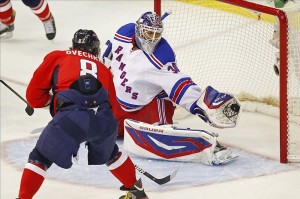
With the Rangers and Capitals facing off in the postseason for the third time in four years, let’s take a look back at the two teams’ previous playoff meetings:
Playoff Statistics:
Series Matchups: 7
- Rangers: 3
- Capitals: 4
Playoff Games: 19-22
Goals For: 105 Goals Against: 120
Playoff History:
1986 – Round 2 (Division Finals): Rangers win 4-2
The Rangers clawed their way into the postseason, beating Gretzky and the Oilers in the final week of the season to edge out the Pittsburgh Penguins by a mere two points for the final playoff spot. New York lacked a dynamic offense, getting all of their scoring by committee, and they relied heavily on goaltender John Vanbiesbrouck, who would later win the Vezina Trophy for his regular season performance that year.
Once in the playoffs, the Broadway Blueshirts were ready to battle with the big boys. They knocked off the Philadelphia Flyers, the best team in the Eastern Prince of Wales Conference, in the first round. That victory set the Blueshirts up for a match against the second-best team in the conference, the Washington Capitals.
The Caps led Game 1 by a score of 3-1 before a shorthanded goal by Mark Osborne sparked a Rangers comeback. New York would rally to tie, ultimately winning 4-3 in overtime on a Brian MacLellan goal. The Caps rebounded from the stunning defeat, claiming Games 2 and 3 by a combined score of 14-4. Washington, up 5-3 midway through the third period of Game 4, was poised to take a commanding series lead The Rangers again battled back, tying the game with just over two minutes to play and going on to a stunning 6-5 overtime victory.
With the series tied at two games apiece, the heavily-favored Caps seized the opportunity to regain control. They jumped out to a 2-0 advantage in Game 5, but couldn’t hang on to the lead. Forward Pierre Larouche scored to get the Rangers on the board and assisted on the game-tying goal that knotted things up at two. The momentum swung strongly in the Rangers’ direction, as they went on to score two more unanswered goals on their way to a 4-2 victory. Back home for Game 6, Larouche kept on scoring. His two goals were all the Rangers needed to send the Caps packing in one of the noisiest games at the Garden, this 2-1 clincher. Watch it courtesy of the boys over at Ranger Crisis:
The Rangers would fall to the Canadiens in the Conference Finals in five games, thanks mostly to the spectacular efforts of the Habs’ rookie netminder – a guy named Patrick Roy.
1990 – Round 2 (Division Finals): Capitals win 4-1
The Rangers won the Atlantic Division, barely squeaking by the Devils in the regular season, with one fewer win but four more ties. John Ogrodnick paced the team with his best output in New York, scoring a team-high 43 goals in the regular season. After a 4-1 steamrolling of the New York Islanders in the first round, the Rangers again met up with the Capitals in Round 2 of the playoffs.
Coming off victories of 6-1 and 6-5 to close out the opening round, it looked like the Rangers’ offense was firing on all cylinders. That momentum carried into Game 1 against the Capitals, when the Rangers dominated in a 7-3 victory on Garden ice. Bernie Nicholls led the way for the Rangers with a hat trick, and Ogrodnick chipped in with a goal and an assist. That was as good as it would get for New York.
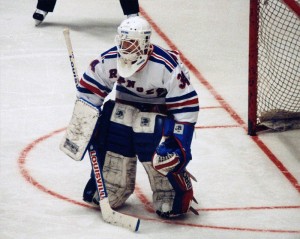
“[The Capitals] came out mad for the second game. They were ticked off, and you could see it in their play,” said Rangers goaltender John Vanbiesbrouck. “They came out crashing and banging around the net, like they didn’t care what happened. It’s how we have to react.” Unfortunately, the Rangers couldn’t match the Caps’ intensity.
Nicholls and Ogrodnick would struggle to find the scoresheet again, netting only one more goal apiece for the remainder of the series. Capitals forward John Druce, on the other hand, would score as many goals in this series as he had throughout the entire regular season. (Don’t know Druce? Let Japers Rink school you.)
Ranger coach Roger Neilson was using a goalie rotation in the playoffs, having John Vanbiesbrouck and rookie Mike Richter alternate two-game segments. While it may have made for an equitable balance, it may have shaken the veteran netminder’s confidence a bit. In Game 2 against the Capitals, only his second home game of the postseason, Beezer allowed a horrific five goals on 12 shots before being pulled in favor of Richter. Richter finished the game strong but delivered his own equally terrible appearance in Game 3, a 7-1 loss in which the Caps had 49 shots on goal. Richter got the nod for Game 4, a respectable-if-painful 4-3 overtime loss where defenseman Rod Langway, held without a goal all year, potted the overtime winner for the Capitals.
With the season on the line, Neilson went back to Beezer who gave a great 32-save performance in Game 5. The offense, though, failed to show up, with defenseman Normand Rochefort scoring the Rangers’ lone goal in a 2-1 defeat. As far as the game winning goal for the Caps? None other than John Druce, shaking off a Greschner check in the slot to send the Rangers to the golf course and the Caps to the Conference Finals for the first time.
Not sure which is worse – the video quality or the song. It’s cued it up to the Rangers/Caps highlights, but rewind it for some additional auditory suffering (or to revel in watching the Devils lose to the Caps in the first round).
I can’t believe they lost to these guys:
1991 – Round 1 (Division Semi-Finals): Capitals win 4-2
For the second straight year, the Rangers and Capitals met in the playoffs. The Rangers won the season series 4-2-1, finishing just four points ahead of an improving Capitals squad. It was a relatively even matchup. Both teams had balanced scoring up and down their lineups and both teams’ leading scorers were defensemen – Leetch and Hatcher. The Rangers had the best offensive weapon in the series in Mike Gartner, whose 49 regular season goals were fifth-best in the league. In the playoffs, though, he’d score only one.
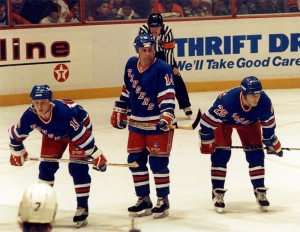
Just like in their previous two meetings, the Rangers took Game 1, this time in a 2-1 nailbiter at Madison Square Garden. It was all Capitals in Game 2, winning 3-0 on the back of Don Beaupre and his 36-save shutout.
The Rangers stormed back in Game 3, hammering the Capitals in Landover by a score of 6-0. Bernie Nicholls led the way with a four-point night. Both Nicholls and the Rangers left it all on the ice that night. Apparently so much so that they had nothing left for Game 4, which the Caps won 3-2.
Game 5 was a close battle, with the Blueshirts holding a 4-3 lead with just over ten minutes to play in the third. Three minutes later, Washington defenseman Kevin Hatcher knotted the game at 4-4, sending the teams to overtime. Dino Ciccarelli won the game 6:44 into the extra period on the Capitals’ 55th shot on goal. The Caps rode that momentum to a 4-2 Game 6 victory to win the series.
1994 – Round 2 (Conference Semi-Finals): Rangers win 4-1
Hello again, old friends. For the third time in five years, the Rangers and Capitals were once again clashing in the playoffs. The Blueshirts were a much different club from their last series against Washington. Richter had taken over as the number one goalie (with John Vanbiesbrouck exiled to the expansion Florida Panthers) and Brian Leetch adding a Norris Trophy and All-Star appearance to his resume. They’d also brought in captain Mark Messier, who led the team to their second President’s Trophy in three years.
The Capitals handled a talented Penguins team in the first round, taking the series in six games. They found a much tougher opponent waiting for them in Round 2. The Rangers swept the Islanders to open the playoffs, outscoring them 23-3 in the four games. These Rangers, safe to say, were pretty good.
The Rangers offense kept pace, outscoring the Capitals 14-5 in the first three games. The Capitals battled back, scoring four unanswered goals to hand the Rangers their first loss of the playoffs. Richter, impressive with three shutouts in the first seven postseason games, got the hook, with backup Glenn Healy making a rare playoff appearance in the Rangers’ net.
Richter and the Rangers resiliently returned for Game 5 at the Garden. Thanks to two goals from Adam Graves, 28 saves by Richter, and a four point night by Brian Leetch that included the game-winning goal, the Rangers were able to close out the Caps.
Their next two matchups would prove much more difficult, as both the Devils and Canucks pushed the Blueshirts to seven games in their respective series before the eventual 1994 Stanley Cup Victory.
2009 – Round 1 (Conference Quarterfinals): Capitals win 4-3
Fifteen years between playoff meetings was a long time for these clubs. Of course, when you go seven straight seasons of missing the playoffs, these things happen.
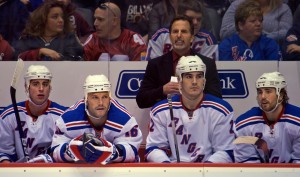
It was a rough year for the Rangers. After getting off to a hot start, the Blueshirts cooled considerably – so much that head coach Tom Renney was fired midway through the year. In came the fiery John Tortorella, who would live up to his short-tempered reputation in the playoffs. Also returning to New York was Sean Avery, back for a sloppy second tour of duty.
The Capitals were heavy favorites in the matchup. Washington’s leading scorer, Alexander Ovechkin, finished the year with 56 goals, best in the league and the third time he’d eclipsed the 50-goal mark in four years. Across the table, the Rangers’ leading scorer, Scott Gomez, finished the year with just 58 points – two points fewer than Ovechkin had goals. Markus Naslund led all Rangers in goal scoring with 24.
Unable to match their opponent’s firepower, the Blueshirts’ only hope would be in smothering the Caps offensive and playing a close-checking, defensive game. That’s exactly what they did.
The seventh-seeded Rangers shocked the Capitals by grabbing a 2-0 lead in the series, winning the opening game in D.C. by a score of 4-3. Caps coach Bruce Boudreau benched goaltender Jose Theodore for Game 2, opting to go with unproven rookie Semyon Varlamov. The Rangers blocked 29 shots with Lundqvist stopping another 35 in Game 2. Varlamov was nearly as good at the other end of the rink, allowing only one goal – the game winner scored by Ryan Callahan on the team’s second shot of the game. The Caps’ backstop was even better in Game 3 as he led the Caps to a 4-0 shutout victory, with two goals by Alex Semin to propel the offense. Lundqvist outdueled his counterpart in the fourth game, stopping 38 shots en route to a 2-1 victory and a 3-1 series lead. Game over? Not by a long shot.
After disciplinary issues in the prior game, Tortorella opted to bench agitating forward Sean Avery. Not only did the Rangers lack a spark on the ice, but they also remained undisciplined even with Avery out of the lineup, taking 38 minutes of penalties in the game. Flat and uninspired, the Blueshirts fell to the Caps in a 4-0 loss that even saw Lundqvist pulled in favor of Steve Valiquette prior to the start of the third period. The biggest disciplinary issues in Game 5 came from behind the bench, where Tortorella got into an altercation with a fan that resulted in his suspension for the following game.
Assistant coach Jim Schoenfeld was behind the bench and Sean Avery was back in the lineup for Game 6. Interestingly, Schoenfeld was manning the helm for the Caps back in 1994, the last time these two teams met in the playoffs. The changes failed to motivate the Rangers, who never led in the game and trailed 5-1 at one point before scoring two meaningless goals late in the game.
Game 7 was, as nearly all are, a toss up. The Capitals were trying to complete the series comeback while the Rangers were trying to regain their footing and win the series they’d once led 3-1. Tied at one with five minutes to play in the third, it looked like the deciding game would go to overtime. That’s when veteran Sergei Fedorov skated down the right wing and fired a shit that eluded Lundqvist high on the short side. The Caps held on to that 2-1 lead, limiting the Blueshirts to just one shot on goal for the period — none after the go-ahead goal was scored. Five minutes more and the Rangers’ season was over.
2011 – Round 1 (Conference Quarterfinals): Capitals win 4-1
With a win against the Devils on the last day of the season the Rangers limped in to the 2011 playoffs. For some of them, literally, as Ryan Callahan broke his leg in the final week of the regular season blocking a Zdeno Chara shot in a stirring 5-3 comeback win against Boston. The eighth-seeded Rangers faced off against the conference champion Caps as major underdogs, even moreso with their second-leading scorer on the mend. Washington was also boasting a new number one goaltender in Michal Neuvirth, who’d outplayed Varlamov in the regular season and got the nod in the playoffs.
The Rangers jumped out to a 1-0 lead in Game 1, but the talented Caps squad wouldn’t let it stand. Alex Ovechkin tied it late in the third, and an intercepted clearing attempt led to Alex Semin’s game-winner in overtime. Channeling Semyon Varlamov’s performance from their previous series, Neuvirth stood on his head in a 2-0 win in Game 2. The high-scoring, freewheeling Caps were suddenly a defensive force on the ice. They kept it tight in Game 3, but the Rangers would not be denied in their first game of the series on home ice. Some hard work – and a lucky bounce on Dubinsky’s game-winner – had them back in the series.
The Rangers would ride the wave of momentum into Game 4. After two periods of play, the Blueshirts held a commanding 3-0 lead. Then, the wheels fell off. Just 2:47 into the third period, Alex Semin and Marcus Johanssen scored back-to-back goals less than a minute apart to get the Caps within one. Johanssen struck again to tie the game midway through the period. The teams battled hard through the first overtime, with both sides equal to the task. It seemed like the game would come down to a lucky play or a bad bounce. It ended up being the latter.
After making a stop on harmless shot from Jason Chimera, a miscommunication between Marian Gaborik and Henrik Lundqvist send the puck bouncing off Chimera, who was skating after his own rebound. Rather than force a faceoff – likely all he was intending to do – the puck caromed off his shins and into the Rangers’ net to give the Capitals an amzing 4-3 comeback victory. Rather than going back to Washington tied at 2-2, the Capitals could now go home and close out the series – which is exactly what the Caps did. Mike Green opened the scoring 5:59 into the first period and the team never looked back. The Rangers were held scoreless, finally breaking through on Neuvirth with 30 seconds left to play. By then it was far too little, far too late, as the Rangers were sent packing after five games.
2012 – Round 2 (Conference Semi-Finals): Rangers win 4-3
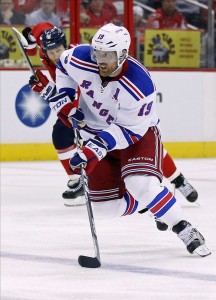
After their playoff loss to the Caps, the Rangers required a bit of retooling. Out went Chris Drury and in came Brad Richards. A few other minor changes,including the addition of speedy Carl Hagelin, along with individual improvements, created a much more dangerous Rangers squad that finished first overall in the Eastern Conference. Despite their regular season success, it looked like the Rangers wouldn’t make it past the eighth-ranked Senators in the first round. Down 3-2, the Rangers rallied to win two straight to move on and face the Caps. Washington was coming off a tough series of its own, requiring overtime of Game 7 to finally slay the Bruins and advance on a clutch goal by Joel Ward.
For the third straight matchup, the Capitals would have a new starting goaltender in their series against the Rangers. Braden Holtby, after playing just seven regular season games, got the start in the Caps’ crease. The opening game was a tight-checking battle, with neither team developing sustained offensive pressure. The teams were tied at 1-1 when the Rangers broke through with two goals in 1:30 as rookie Chris Kreider – fresh off a national championship with Boston College – and Brad Richards combined to give New York a 3-1 victory. Another close match followed in Game 2, with a late power play goal by Alexander Ovechkin silencing the crowd at the Garden and giving the Caps a 3-2 win to even the series. The next game would be huge… in more ways that one.
With the series tied, Game 3 was pivotal. Like the preceding games, it would be close. So close, in fact, that it took over 105 minutes to determine a winner. The triple-overtime marathon was the fifth-longest game in Rangers history, stretching late into the wee hours of the night. Ryan McDonagh led the ironmen on the ice, playing an exhausting 53:17, most of it against the Caps’ top line. Marian Gaborik provided the heroics to send the teams to the locker rooms, with the Rangers celebrating a hard-earned win and a lead in the series.
Another late goal in Game 4 – this time by Mike Green with 5:48 left to play – gave Washington a 3-2 win and knotted the series a two games per side. The Caps were poised to take a series lead in Game 5, holding a 2-1 advantage as the final minute of the third period ticked away. Brad Richards wasn’t ready to let then take the lead so easily. He chopped at a loose puck in the crease, sending it past Holtby and sending the game to overtime. Marc Staal needed just one shot to finish the comeback, a blast from the right point that allowed the Rangers to snatch a key win from the clutches of defeat.
The unflappable Capitals weren’t shaken by the Blueshirts’ emotional comeback. They came out in Game 6 playing like a complete, cohesive unit. Their collective defensive efforts kept the Rangers off the scoreboard until the final minute of play, when Gaborik scored with Lundqvist on the bench for an extra attacker. A 2-1 win for Washington forced both teams to play their second straight seven-game series.
The Rangers came out fired up for Game 7 at Madison Square Garden. Brad Richards, coming up clutch in the series, opened the scoring at 1:32 of the first on a play set up by the blazing speed of Carl Hagelin. That score would hold up until midway through the third period when the two clubs traded goals 38 seconds apart to set the score at 2-1. The Caps just couldn’t find the equalizer as the defensively-focused Rangers held them to only four shots in the period.
2013 – Round 1 (Conference Quarterfinals)
Thursday night opens a new chapter in the history between these two playoff combatants. The former Patrick and Atlantic Division rivals will also find themselves again in the same division next season under the league’s realignment plan. Whatever the outcome this time around, the story of these two teams is a long way from over.